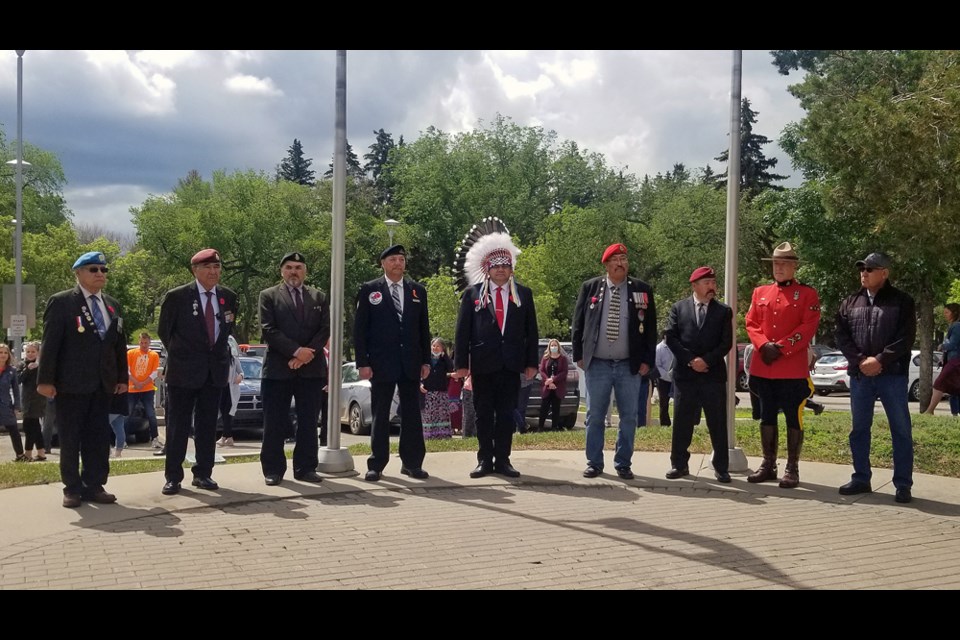SASKATOON — The Saskatchewan Health Authority held a ceremony on Tuesday where the truth and reconciliation flag was raised at the Saskatoon City Hospital as part of the celebration of National Indigenous Peoples Day.
Elders and other leaders of First Nations communities, residential school survivors, Indigenous Canadian Armed Forces veterans and SHA officials and hospital staff were present to witness the formal ceremonies outside SHA’s corporate office.
SHA interim Chief Executive Officer Andre Will said Tuesday’s ceremony is their way of paying respect to all Indigenous communities in the province.
“On behalf of the [SHA] and our 43,000 employees, I’m proud to be here on Treaty 6 Territory and homeland of the Métis for this important ceremony. We pay our respects to the traditional caretakers of this land as we celebrate National Indigenous Peoples Day. We understand that there are many steps that we need to make to move forward in reconciliation and today is a very important part of our work,” said Will
“We know that to move forward, we must begin by taking an honest look at our past. We must recognize the pain, loss and dislocation suffered by so [many] in the past before we can move forward. It starts by listening. Without truth, there could be no reconciliation. The residential school system has produced decades and generations of negative outcomes not only to those who attended the schools but also for families of their descendants.”
He added that the health and well-being of a person are among the impacts of residential schools to survivors and their communities, and that is where SHA comes in to assist First Nations and Métis Peoples.
“We believe that we have a key role to play in addressing harms related to health through constructive action within the SHA. At SHA, the provincial health authority, our focus is to ensure patients receive high-quality primary health care regardless of where they live in Saskatchewan.”
“We strive to create a safe and welcoming environment for all in our health care facilities and we look forward to our patients, residents, clients, families, friends and staff to help us in this goal by treating each other with respect and dignity.”
Prince Albert Elder Isabelle Impey delivered the opening prayer, adding that she believes Canadians are on the right path to reconciliation after seeing the support shown by members of the community.
“Reconciliation belongs to all of us. Today is part of that journey in many cases — the journey that’s new to many. Reconciliation cannot be rhetoric. Reconciliation has to be done with a kind heart, a good understanding, and the desire to make changes and not to let history repeat itself. You being here, clearly shows us elders that’s the direction that you’re going, by showing your support in the reconciliation flag-raising today,” said Impey.
Elder Georgina Musqua, a member of Keeseekoose First Nation, was emotional in sharing her experience attending a residential school where she survived by eating table scraps given to her by the administrators and officials of the school.
SHA Traditional Knowledge Keeper Advisory Council member Louise Halfe, SHA patient family partner Priscilla Johnstone and Métis Nation-Saskatchewan Minister Kathie Pruden were the other guest speakers.
Saskatchewan First Nations Veterans Association Grand Chief David Gamble, Ret. Sgt. Barry Ledoux, Rick Gladue, Steven Ross and Emile Hyway were some of the veterans who attended the event while Ambrose Metsikassus, Sakoteniase Neytowhow and Darrell Paskimin performed the flag and victory song while the reconciliation flag was being raised.



